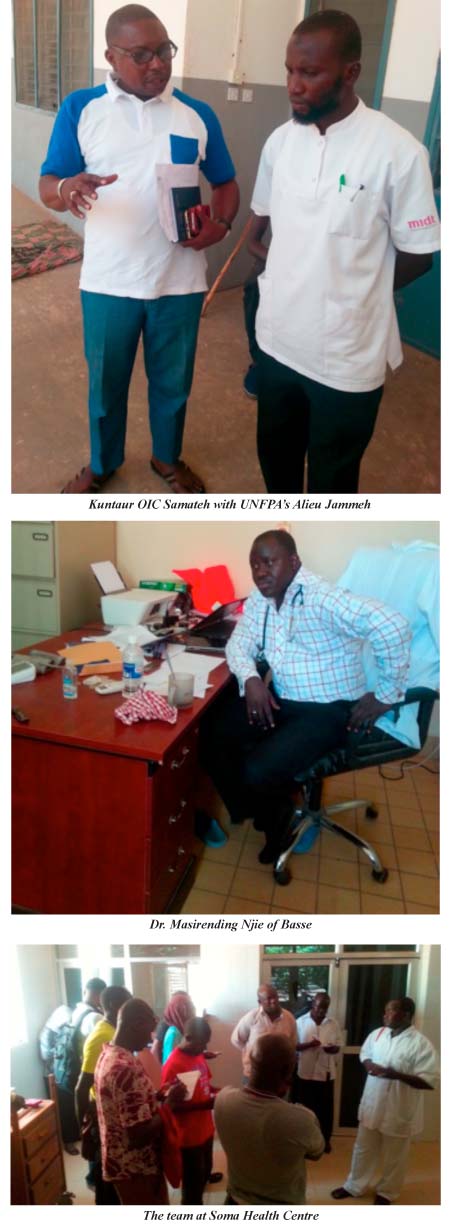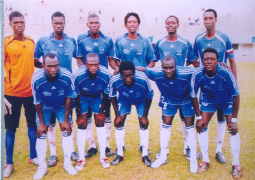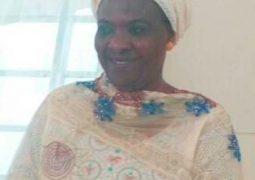
They said this during a media field visit to UNFPA intervention areas across the country, organised by UNFPA in partnership with Network of Journalists on Reproductive Health, Population and Development.
The aim of the visit, according to UNFPA officials, was to familiarise the media on UNFPA project intervention sites, to discuss with project staff and beneficiaries, and hold key informant interviews with prominent local personalities.
The object of the visit was to give media personnel first-hand information, to generate human interest stories related to the work of the UNFPA in The Gambia and with UNFPA expectations, and to also create a better working relationship between UNFPA and NJORPAD.
The media field visit was based on the theme: “Enhancing partnership with media to promote visibility - a pathway for showcasing grassroots stories and amplifying the voice of the marginalized.”
At the Regional Health Team office at Soma, Basiru Drammeh told the team that UNFPA provides them with FP commodities, which helps mothers greatly in terms of birth-spacing.
He said the Soma Health Centre surgical operations theatre was not functional for a number of years, but with the intervention of UNFPA, which came in and refurbished everything, they are now able to perform caesarian sections, and this has drastically reduced maternal mortality, as well as the referral rate to the hospitals in Banjul or Farafenni.
UNFPA also provided an ambulance for emergencies, improving obstetrics care, which is deployed at the Soma Health Centre and had also contributed in reducing maternal deaths in the region.
Mr Drammeh said they were also provided with benches, which they used at the RCH clinics, and recently they wrote to UNFPA for the Bureng OIC to be provided with a motorcycle.
He added that the attitude of men with regards to FP commodities still remains a challenge. However, with more community sensitization, people are coming on board to make sure that their women use FP commodities.
He said another important project that the UNFPA is funding is the “Kaabilo Baama-Kaabilo Faama” initiative in Kiang West, which is aimed at encouraging communities to be using health facilities by seeking healthcare services earlier.
According to Mr Drammeh, UNFPA helped them in getting an obstetrics and gynae doctor after refurbishing their health facility.
UNFPA also paid for the doctor’s accommodation, before the government took over, and wished the UNFPA could take back that responsibility, as this “would really help” them.
He also pleaded with the UNFPA to help them with staff quarters, as this would help maintain the staff.
At the Basse Health Centre, Dr. Masirending Njie, a medical officer, obstetrics and gynae doctor, who said in as much as people are dying from complications, people are also surviving some complications at the health facility.
He said most people do not know about the interventions of UNFPA, when it comes to health service delivery in The Gambia, adding that most of the maternal lifesaving drugs are provided by UNFPA.
Even the mobile scanning machine, that they are using, came from UNFPA and was passed through the Health ministry to Basse Health Centre.
Dr. Njie said if all their partners are doing what UNFPA is doing, bringing journalists to see their intervention areas, then people would know and start to better appreciate the work of the UN agencies in the country.
For instance, most of the FP commodities they are using were donated by UNFPA and, due to the intervention of UNFPA, during the whole of the first quarter they did not have maternal deaths in URR and the maternal mortality rate has drastically reduced.
With more sensitization, women are responding to FP commodities, but more needed to be done, he continued.
At the Kuntaur Health Centre, Musa Samateh, the officer in charge, echoed similar sentiments.
The UNFPA country office in The Gambia had provided financial and material support to refurbish and equip the Kuntaur Major Health Centre, including the operating theatre to provide emergency obstetrics and new-born care services to enhance maternal and child health in the Central River Region.
At Boraba, Kejaw Kuyateh explained to the team how the intervention of UNFPA had helped change the lives of women in that community, in terms of knowledge on health issues including the use of FP commodities, which had greatly helped the women in terms of birth-spacing.
She also explained how women make best use of early antenatal care and health facilities, which has helped reduce maternal deaths in Boraba village community.
Indeed,
all the beneficiaries referred to UNFPA as “a genuine partner”, and appealed to
UNFPA to do more for them in its drive to make sure they deliver “a world where
every pregnancy is wanted, every child-birth is safe and every young person’s
potential is fulfilled.”




